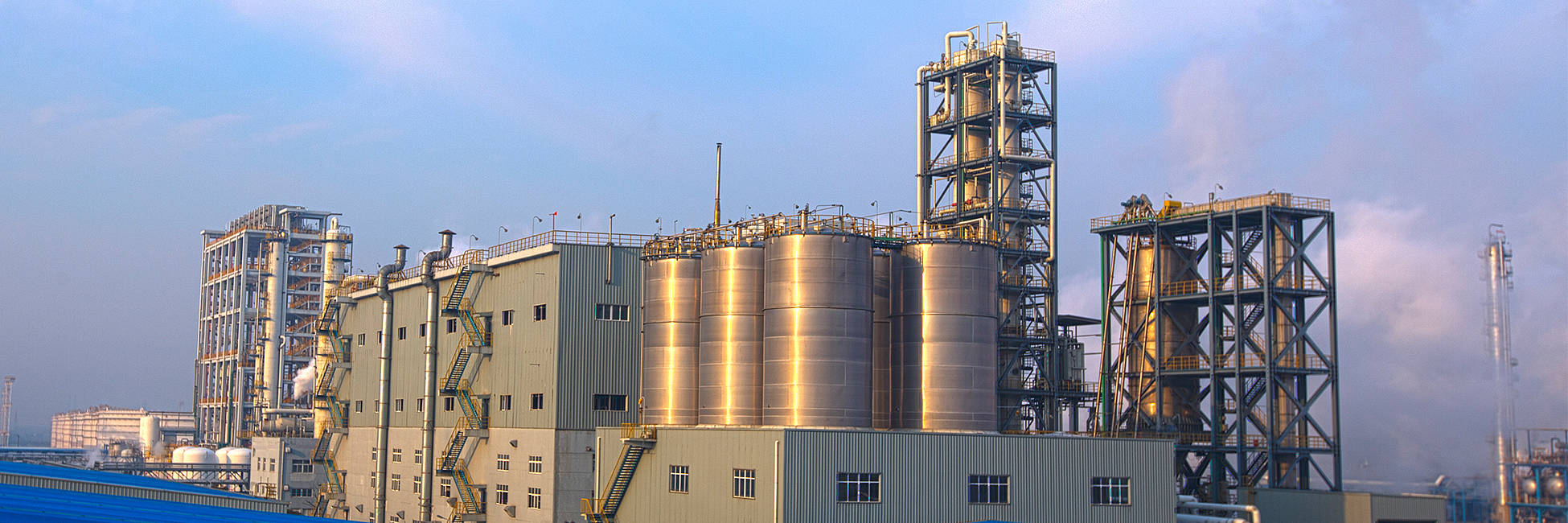

Our high level of detailed knowledge for your specific customer request.
Polymers and fibers are still on the advance. The aerospace and automotive industries, wind power, mountain bikes, and Formula 1 all require speed, precision and strength, which places very high demands on weight, material and processing. Our team has been working for decades on the remarkable polymeric chemical compounds that are used as starting materials to make high-performance fibers. This is because polymers and fibers have individual and unique properties that are very modifiable.
For this reason, the EPC Group regards polymer and fiber production plants as being very important. We are continually researching the possibilities of widening the uses of existing polymers and their modified forms.
We develop innovative ideas for our customers, which our experts implement both in customized new plants and in the most cost-effective, tailor-made plant revamps. The planning and commissioning of each polymer and fiber plant are precisely tailored to meet the customer's requirements. The decades of experience of our engineers enable them to provide an extensive range of services and exploit many different synergies.
EPC specialists combine a high level of detailed knowledge with their own research and development activities to develop proprietary processes and technologies.
Our experts' detailed knowledge also helps those customers who would like to implement their own ideas – for example in existing plants – to meet the future demands of changing markets.
Intelligent solutions for the widest range of polymer modifications and spun-dyed products.
The EPC Group mainly uses wet spinning processes for spinning PAN, viscose (cellulose carbamate) and Lyocell. The portfolio of the EPC Group for melt-spun polymers includes the polymers: PET, PA6, PA6.6 and PP. Support can also be provided for a number of special products, such as PTT, PEN and PLA.
These fibres are used in the textile industry, in technical applications, such as airbags, parachutes, vehicle tyres, advertising banners, truck tarpaulins, etc., as well as for special applications, such as composite materials in the carbon fibre industry. The yarns are produced either as continuous-filaments or in cut form as staple fibres, which are cut to lengths appropriate for the particular applications.
The engineers in the EPC Group offer their customers a wide range of support. This ranges from consulting services to optimise or revamp a plant, or to make it capable of producing other products. This may simply involve designing the layout of polymer pipes with EPC's own Polymer pipe program or entail taking overall responsibility for production complexes: from the polymerisation to the further processing stages, such as fabrics and dipped tyre cord.
Our experts can take synergies from other areas of our product portfolio, such as compounding PC for the automotive industry, to offer our customers solutions for the widest range of polymer modifications and spun-dyed products by retrofitting existing plants. We can also provide our customers with expert assistance for the implementation of their own ideas and technologies. For example bringing pilot plants up to production scale.
EPC Exclusives
Intelligent plant design with EPC variPLANT®
EPC variPLANT® gives you the following competitive advantages:
- Highly flexible production
- Consistent product quality of the highest standard
- Gains from economies of scale
- Compact plant design
- A high degree of automation and ultra-modern process control
- Technology for efficient consumption of energy and operating materials
- An environmentally friendly design that meets the requirements of EU standards
PET plant expansion and optimisation with EPC PETvantage®
EPC PETvantage® is the most cost-effective alternative to investing in a new plant. Depending on the plant configuration, a return on the investment is usually achieved in less than 2 years. In most cases, the main reactors do not need to be replaced. Operational safety, product qualities and production capacities are increased by a multiple, depending on the basic design of the plant and the space available on site.
EPC PETvantage® generates very high profits, mainly through quality assurance and the consequent greater competitiveness:
- Plants converted to use alternative raw materials or produce new types of polymers
- Conversion from textile to bottle PET
- Flexibility – thanks to polymer modification for the production of specialities
- Versatility through direct spinning to produce fibre and filament yarn specialities
- Lower consumption, for example, of blue toner
EPC inside PET® – fully automatic operating software
Commercial and qualitative advantages of EPC inside PET®:
- Waste and "out of spec" products reduced by more than 80%
- Freer choice in the purchase of raw materials, unaffected by fluctuations in raw material quality
- Continuous plant operation and control increase capacity
- More stable product quality
CHDM Hydrogenation Technology
EPC Group has vast experience in the polymers and fibers industry and offers complete engineering packages in delivering world-class polymer/fiber manufacturing plants. For the production of high-quality PETG, PCT, PCTG and PCTA, EPC Group offers its modern CHDM Hydrogenation Technology for the production of top-grade CHDM.
EPC’s highly efficient and flexible continuous hydrogenation process guarantees a feasible production of top quality CHDM. Furthermore, having your own state-of-the-art CHDM production line will ensure a continuous supply of high-grade CHDM as raw material for the manufacturing of high value polyesters resin for the fast growing technical applications in electronics, food and medical packaging, construction components and consumer goods.
Masterbatch plants
In the refining process, the desired additives are added to the raw polymer material in a mixer, and intermingled in the extruder. The melt is then allowed to solidify again in a cooling trough, after which it is cut up in the granulator. With the masterbatch process, EPC enables its customers to change the products their plants produce quickly and keep cleaning costs low. Energy-efficient extruder systems are long lasting, and economical because the waste heat from the extruders is fed back into the entire plant for re-use.
EPC PAtraction – the efficient extraction process
Theprocess patented by EPC enables the material to be optimally substituted by means of nitrogen evolution in combination with a higher pressure. This significantly reduces the extract content in the granulate, while at the same time enriching the extract water to about 18%, and achieving a considerably more consistent retention time. This minimizes fluctuations in the extraction concentration.
The extraction process developed by EPC can also be used in existing plants without requiring any large investments or lengthy modernisation times. A special device distributes nitrogen into up to 16 extraction zones in the column. Granulate flows from top to bottom through a packed bed in the device.
The nitrogen and extract water are fed upwards in a counter-flow. The extraction rate depends on the number of trays, which is determined on a case by case basis. The device consists of trays arranged one above the other. Nitrogen is distributed homogeneously through these trays.
Advantages of the solution patented by EPC:
- Formation of many extraction zones in one extractor (12 to 16 zones)
- High utilisation rate of the extract volume (up to 98%)
- The extraction effect improved by maintaining a highly consistent retention time for the granulate in the extractor combined with the high homogeneity of the water in the zones create the conditions for keeping the extract content of the granulate within tight tolerances
- A specific, differentiated diffusion drop within the zones enables the highest extract water concentrations to be obtained at the outflow (> 18%) while simultaneously reducing the residual extract content in the granulate (< 0.25%).
- Existing extractors retrofitted with short shutdown times and low investment costs
- Higher granulate capacity and product quality, low mechanical requirements
- Short return on investment time with substantial energy savings in the lactam recovery, maximum energy efficiency
- Minimized vapor consumption for recovery, smaller vaporizer plants for new investments
- Reduction of plant size, volume and height, smaller space requirement with higher capacities
- Reduced specific granulate production costs
Compounding plants for polyamide
PAN – special reactor material for trouble-free, low-maintenance operation
EPC has developed a reactor material based on a special aluminium alloy that is inert under the reaction conditions (no material abrasion), and consequently has no effect on the reaction medium (no uncontrolled reaction behaviour). The material is used in the manufacture of the reactor and in the up and downstream stages involved in the polymerization reaction. Plant components made of this material do not have to be replaced during the projected lifetime of the plant.
Avoiding deposits building up lengthens production cycles. Less frequent cleaning increases the production capacity and reduces the use of cleansers. The material has strength properties similar to those of steel, and can be worked with conventional machining and forming processes (rolling, bending, grinding, polishing, welding).
Phosgene-free EPC technology for producing polycarbonate
EPC variYARN®
The technology
- Individual spinning positions with gravimetric masterbatch dosing for changing the formulation quickly
- Individual extruder and additive dosing capable of modular expansion
- Upgradable for liquid dye dosing technology
- Upgradable for polypropylene spinning (PP)
- Shortest product retention times for optimal properties
- Individual spinning point parameterization
EPC variPILOT®
Choosing EPC variPILOT® is a good decision. We examine the site, and specify the future location of your pilot plant before we configure it. We plan and construct your specific test plant in accordance with the conditions, the product parameters and your requirements. We deliver your variPILOT®plant pre-assembled, so it can be quickly and easily installed and commissioned.
- All the necessary ancillary plants and even a laboratory are available
- Basic, detailed and turnkey engineering – all from one source
- Flexibility to meet every degree of complexity of your customers' requests
- High productivity with maximum variability of your production program
- Longer campaigns with economical batch sizes (waste and intermediate products are minimized)
- More economical than other comparable large extruder plants
- Highly variable number of Variyarn® modules per spinning line, for example 2, 4, 6, 8, 10 or 20 spinning modules







